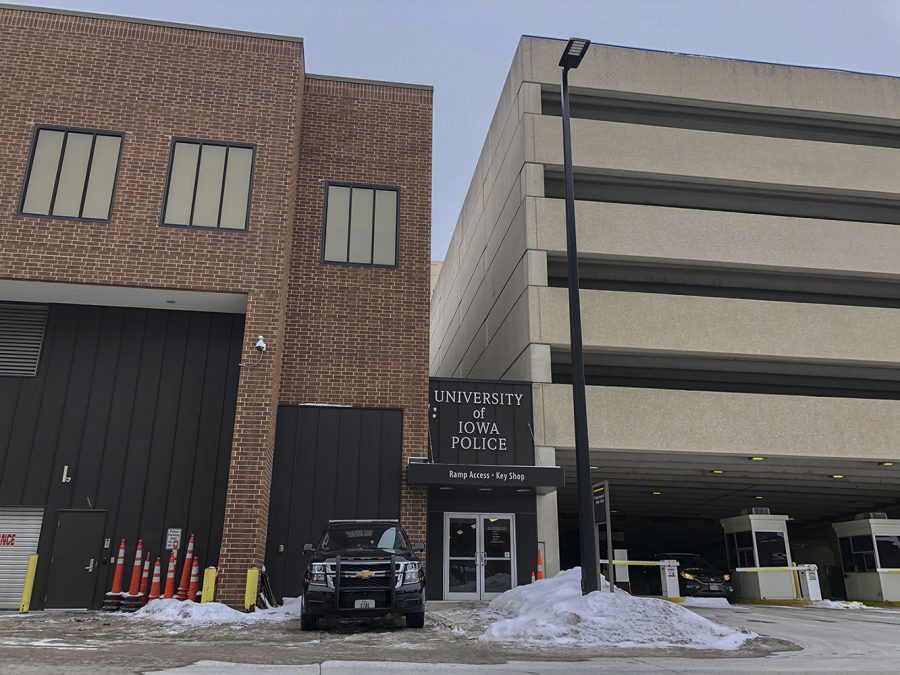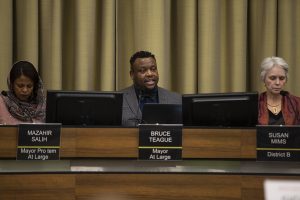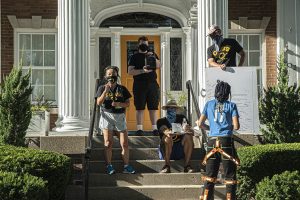University of Iowa considers three models to change approach to campus safety
After calls for systemic change within the university’s police force, the Reimaging Campus Safety Action Committee presented three models, with changes spanning from increased training for officers to minimizing police presence on campus.
The University of Iowa Police Station is seen on Monday, Feb. 15, 2021.
February 16, 2021
Born of a summer of racial-justice protests calling for systemic change at the University of Iowa, the university’s Reimagining Campus Safety Action Committee is moving forward on its goal to rework the UI’s approach to campus safety.
The committee held two town hall meetings in February to gather feedback on three potential plans depicting how campus safety could be tweaked or overhauled. The plans were designed with specific attention to how safety affects people of color and other communities that have been historically harmed by police.
UI Vice President for Student Life Sarah Hansen, who chairs the committee, said the group will compile input from the town halls and other avenues, and she hopes to present a recommendation to UI President Bruce Harreld by mid-March.
The first model is focused on recruiting a diverse campus police force and heightening anti-racism and implicit bias training for campus officers.
UI Interim Co-Director of Public Safety Mark Bullock, who sits on the committee, said these forums have given the UI Police Department a chance to highlight steps that he believes many community members don’t know the university has taken.
“A lot of things that we do are behind the scenes, developing programs in our community and working with community partners, campus partners to create opportunities for non-law enforcement responses,” Bullock said.
The committee suggested the creation of a campus wellness division as part of the first model that would respond to less imminent safety threats, such as mental health crises and substance abuse. Emergency dispatchers would decide who should handle calls for service.
The second model, the “holistic approach,” suggests a more dramatic overhaul of the university’s approach to campus safety. It would minimize UIPD presence on campus and divert service calls to other professionals, such as crisis and health care workers.
Under this model, the UIPD would only respond to more serious crimes and wouldn’t be on campus unless requested.
The third approach suggests the creation of an oversight committee focused on police accountability and considers past actions from the campus police department and makes recommendations. It would be overseen by a president’s cabinet member.
Hansen said the three models are tentative, and the committee could combine any number of approaches in its final recommendation to Harreld.
“One of the most important things is that even though they’re presented as unique, discrete models, there are elements of the potential models that could be broken down and reconstituted in different iterations,” she said.
Hansen said Harreld will most likely share feedback and discuss the effectiveness of each model with the cabinet, which includes the university’s vice presidents. She said the university could begin acting on those changes by this summer.
The committee developed the three prototypes in response to initial feedback from the university’s cultural centers and diversity councils, Hansen said. It’s also seeking campus feedback through a survey on the Division of Student Life website, she said, and it plans to give presentations to the president’s cabinet, staff council, and faculty senate in the near future.
She said the committee has focused on feedback from diverse groups that are more negatively impacted by law enforcement.
“That was something that we felt was very important, knowing that certain individuals in our community are impacted differently by systems such as law enforcement,” she said. “So, we purposely started with those populations in order to make sure that their feedback was really heard.”
The majority of students who attended the two town halls showed favor for the holistic model, which suggests drastically reducing police presence on campus.
Felicia Pieper, a graduate research assistant in the UI College of Public Health, said she favors the holistic model that is “close to where we need to be going.”
“The thing about policing is it’s a structural problem, and so I don’t think these reformist or add-on policies are going to do anything to actually get at the root causes of the problem that we’re facing,” Pieper said. “And so, the holistic approach gets to that by completely restructuring what safety looks like.”
Pieper said the holistic approach could provide more opportunities for crime prevention by funneling funding into improving health and well-being on campus.
“We know the police don’t prevent crime. Police come after crime has happened — that’s the nature of policing,” Pieper said. “Social determinants of health, like good housing, fair working conditions, safe neighborhoods, along with strong communities, actually are what prevents crime, and that’s what we see in this model.”
While Bullock said UIPD supports what the university decides, he said he prefers a plan that keeps the campus police department involved in campus safety without cutting funding or staff.
“When we talk about cutting staff, especially internally here, at the university Department of Public Safety, there’s faces behind these numbers,” he said. “There’s families behind these numbers and the people that would be impacted.”
He added that, first and foremost, the UIPD wants to serve the community and it would be disheartening to not have officers and public safety employees included in the process to make change and get on “the right side of history.”
Pieper said it was frustrating that UIPD did not mention its involvement in Iowa City protests that occurred on June 3, after the OIR Group, a California-based firm specializing in police oversight, released a report about it in late January. The lack of transparency within the committee is concerning to those who are wanting to see real change, Pieper added.
“It’s really frustrating that this is now the only point where the university is reaching out to the university community for input at the very end of the process,” she said. “They chose a hierarchical, bureaucratic response to that by creating an academic committee that was appointed … It’s not just something to be sour about, but I think that’ll have direct impacts on how our community trusts this process.”
Caleb Klipowicz, a Ph.D. candidate in the UI Department of Anthropology, wrote in an email to The Daily Iowan that he had never thought much about policing until last summer and he started educating himself and learning from the Iowa Freedom Riders’ speeches at marches.
He wrote that, as a Resident Assistant during undergraduate, he never had an experience where police presence in the dorms unannounced made him feel safer.
“For me, a safe campus is one where every student is cared for,” he wrote. “The ‘holistic model’ was the only one I felt could make a real difference. The other two options either increased the budget for police (the opposite of what I believe we need) or created a worthless committee to give the appearance of ‘reform’.”
UI fifth-year Jacob Heid said that he felt the UIPD’s inappropriate response to protests last summer was not something they could just make up for with more trainings and oversight.
“They’ll issue statements on saying what they stand with the black community. They’ll issue statements saying they stand with people of color with LGBTQ individuals, but then there’s no action to substantiate those claims,” Heid said. “There’s been no desire to right the wrongs. Until there are actual attempts to apologize to reconcile to, you know, recognize that maybe police aren’t always going to be an appropriate option for whatever issues that may arise.”
He added that the committee’s decision to give Harreld the final say in selecting an approach does not make sense to a lot of students who attended the meetings.
“I would just hate for everyone to think that the holistic model is the best option, but then for it to be just sort of discarded … because Bruce [Harreld] and his cabinet don’t want to put in the work and don’t want to allocate the resources,” he said. “So, I think there was really a big concern about that as well, which I guess we will see what happens, but I hope that good decisions are made.”






